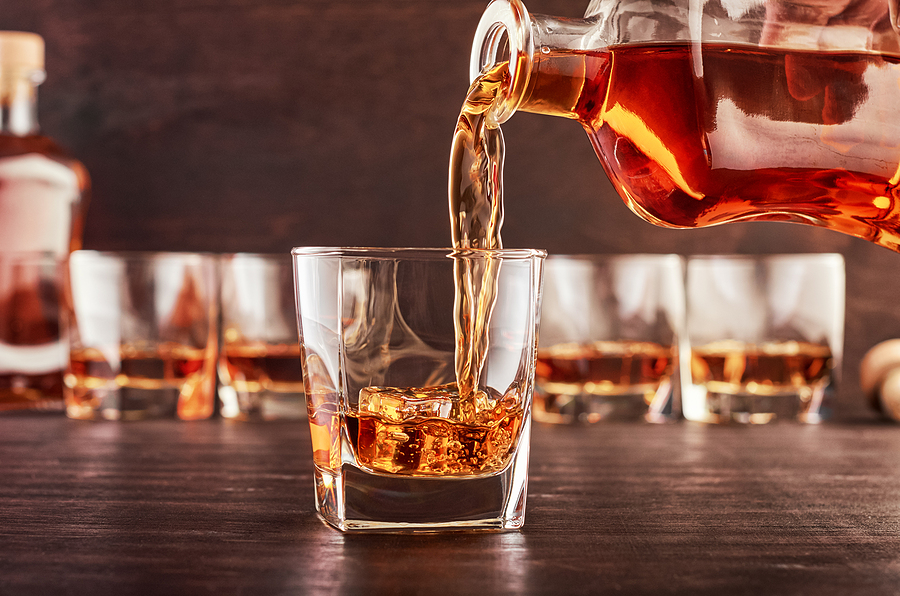Updated 11/07/2021
“You want me to what?” Linda said, looking at me like I’d lost my mind. I didn’t think my suggestion was all that radical, but I was used to her response. This lifestyle change is the one that is most often met with resistance when I recommend it to my clients. What do you think it is?
Changing eating habits? No. Increasing exercise? Nope. Giving up coffee/caffeine? Close, but not quite. What prompts this incredulous response is when I gently suggest setting aside their nightly cocktail.
Linda’s response was fairly typical, right down to her “I can’t relax without it. I’ll never fall asleep if I don’t help my mind calm down!”
Another popular response is, “But research shows that a glass of red wine a day is good for you!”
It’s true that some research has indicated that the resveratrol and antioxidants in red wine may have a positive impact on heart health when consumed in moderation. But there are other ways to boost heart health, and for some people, alcohol could do more harm than good – even in small doses.
While I believe in moderation, and typically think it’s fine to have an alcoholic drink occasionally, there are times when it’s just not wise.
Adrenal dysfunction, often known as adrenal fatigue in the functional medicine community, impacts health in myriad ways. When your adrenals aren’t functioning properly, your hormones become imbalanced and your body can’t function as it should.
I’ve written a lot about adrenal imbalance, it’s causes and what you can do about it. In my recommendations, I always mention avoiding alcohol. And there’s a good reason — alcohol can have a major impact on the way your adrenals are functioning (or malfunctioning).
Anytime a woman comes to me with signs of adrenal dysfunction, I gently suggest that she take a break from alcohol as she heals. In my decades of working with women, I’ve seen firsthand how this one step can speed healing and allow women to find balance.
What I always tell these women is that you don’t necessarily have to avoid alcohol forever. Once the adrenals are healed and functioning properly, enjoying a glass of wine now and then is fine. But you’ll really do yourself a favor and jump start the healing process if you can just hit the pause button on your nightcap for a few weeks.
Are you dealing with adrenal issues? Wondering how alcohol impacts adrenal function and healing? Then you’re in the right place!
Let me illustrate how alcohol and adrenal fatigue are connected – and why it’s a good idea to take a break to heal your adrenal glands.
Understanding Adrenal Gland Function
The adrenals are small triangular glands that sit on top of each kidney. Don’t let their small size fool you – these glands are vitally important to your survival because of the hormones they produce.
While the adrenals produce hormones that impact a variety of functions in the body, the main job of these little glands is to help you respond to stress. That means churning out hormones like adrenaline, which helps your body get ready to act in stressful situations, and cortisol.
Cortisol is a “jack of all trades.” It’s important jobs include helping to convert food to energy, regulating blood pressure and cardiovascular functioning, reducing inflammation and managing the immune response in the body. It also sets the “flight, fight or freeze” response into motion, helping your body respond to threats.
But there’s a problem that many people aren’t aware of: that response is the same whether there’s a true threat to survival or not. And when it’s activated, other functions slow or stop.
That’s fine in temporary situations, but when stressors are constantly triggering the stress response, your adrenals continue to produce cortisol instead of other hormones. This creates (sometimes quite severe) imbalances. With these imbalances come the uncomfortable symptoms of adrenal dysfunction, including fatigue, moodiness, weight gain, and poor sleep.
Does Consuming Alcohol Cause Adrenal Fatigue?
Adrenal fatigue rarely has one single cause. Instead, it’s a compilation of the multiple factors that impact hormonal balance in your body that can lead your adrenals to a dysfunctional place. So, while I can’t say alcohol is the reason for the development of adrenal fatigue, I am confident in my belief that it certainly isn’t helping the situation.
Anything that has an impact on cortisol production will contribute to adrenal issues. Alcohol can cause imbalanced cortisol levels in both directions.
It’s a common fallacy that alcohol reduces stress by promoting relaxation. That might be true of one small drink. The catch is that the relief is temporary – especially since many people have difficulty sticking to just one drink. Often, people pour a glass of wine with no idea that a serving is just 5 oz.
So they may be having two drinks without even realizing it! And when one drink becomes two or three, your adrenal function slows down, and cortisol production can drop. While we don’t want these levels consistently high, it’s also a problem when they fall too low.
On the flip side, individuals with alcoholism have shown much higher cortisol levels than those who do not consume alcoholic beverages in some research. Sudden withdrawal from alcohol can also elevate cortisol levels. The good news is that studies have indicated that after an extended period of abstinence, blood cortisol levels can indeed return to normal.
This suggests that limiting alcohol consumption is an important step to take when trying to heal dysfunction in the adrenal glands. In fact, I think we can agree that overconsumption is never a great idea.
Some research has found that neurological damage is higher in individuals who put their bodies through the cycle of addiction and withdrawal repeatedly. That means that drinking alcohol responsibly is important for long term health, even after your adrenals have healed.
Alcohol, Adrenals and Quality Sleep
When Linda said she couldn’t sleep without a glass of wine, I realized I had to address it. Poor quality of sleep is another common symptom of adrenal fatigue – and alcohol isn’t helping, despite what women like Linda think!
While alcohol might make you fall asleep faster, it prevents you from entering the vital REM sleep stage, which is when mental restoration occurs. Without this essential phase of sleep, you’ll likely find yourself dealing with mental fog and memory problems. That’s one reason so many women with adrenal fatigue wake up feeling as though they haven’t slept at all.
Another reason alcohol and sleep don’t mix well is that alcohol is a diuretic. This means you may wake more frequently to use the bathroom and find yourself unable to get back to sleep.
Alcohol, Blood Sugar, and Weight Gain
One of the most frustrating symptoms of adrenal fatigue for many of the women I work with is stubborn weight gain that they just can’t shed. Letting go of alcohol may be the one thing they haven’t tried – but should!
Alcohol can increase cravings and lower your inhibitions around food. Combined with the calories in alcoholic beverages – which offer no nutritional value – you could be setting yourself up to hold on to that extra weight.
Alcohol can impact blood sugar levels in a couple of ways. First, an occasional drink may raise your blood sugar. More serious, however, is the impact of excess alcohol. Continued overconsumption of alcohol could cause your blood sugar to drop dangerously low, particularly for individuals with diabetes.
Alcohol also impacts insulin production. Alcoholic beverages cause your pancreas to release more insulin which can also lead to decreased blood sugar levels. Low blood sugar can cause lightheadedness, fatigue, and other symptoms seen with adrenal fatigue.
Insulin stores extra glucose in the liver as glycogen. When the liver has no space, it sends the excess energy fat cells instead – usually in the belly. So, alcohol can have a direct impact on the size of your mid-section – causing the familiar “beer belly.”
The Impact of Alcohol on the Heart and Liver
As I said earlier, the most common defense for a daily glass of wine is the research that has said it can promote heart health. However, this research hasn’t determined if it’s the alcohol or the lifestyle choices moderate drinkers make that produces this healthy effect.
Regardless, regular heavy drinking, or binge-drinking even once a week, can lead to heart problems including high blood pressure, irregular heartbeat, and other diseases that impact the heart.
Similarly, every time you drink alcohol, your liver must work overtime. The priority becomes metabolizing the alcohol and clearing it from your system – so the other functions of the liver are put on hold.
When dealing with adrenal fatigue, your liver is already working hard to get rid of excess hormones like adrenaline. So even a small amount of alcohol can disrupt liver function even further. Although this disruption may not be at a clinical level, symptoms can develop, including pain, anxiety, and brain fog. When your adrenals are weak, your liver is at even greater risk of adverse effects from the consumption of alcohol.
Alternative Stress Relief Supports Adrenal Healing
Is it becoming more clear that alcohol is best avoided when your adrenals are already out of balance? If you’ve been using alcohol as a relaxation technique, finding other ways to release tension and ease stress will move your healing in the right direction. Here are a few quick suggestions:
- Try some gentle exercise. While vigorous exercise isn’t advised when your adrenals are out of balance, movement is! Yoga, T’ai Chi, or a relaxed walk in the evening are all great options.
- Try meditation. Meditation can take many forms – you can repeat a mantra or affirmation as you practice deep breathing or follow a guided meditation. There are a number of apps that offer guided meditation and music for relaxation.
- Make time for something you’ve been wanting to try. Taking time for yourself isn’t selfish – it’s a necessity! Whether it’s reading a good book, learning how to dance, gardening or any other activity, you should carve out time to do what you want to do, not just what you have to do.
- Prioritize JOY! Finding something that brings true happiness to your life is essential to your overall well being. So many women have gotten so caught up in daily responsibilities of caregiving and earning a living that they can’t even remember what makes them happy. To reduce stress and increase healing, take the time to remember what brings you true joy – then do it each and every day.
- Process emotional trauma. Internal stress can be the most difficult to release because women often don’t even know it’s there. Find techniques to help you understand and process your emotions – especially if you’ve been holding on to hurt for a long time.
Linda reluctantly agreed to give my “radical” suggestion a try. She couldn’t believe the difference it made! After just a few weeks, she woke up each day with a clear head feeling fantastic – partly because she was actually sleeping soundly for the first time in years! Although the habit was hard to break at first, she said, after a few weeks she didn’t even miss it. She’d replaced her nightly cocktail with a soothing cup of herbal tea – and that truly relaxed her body and set her up for a good night’s sleep.
If you have signs of adrenal dysfunction – poor sleep, weight gain, fuzzy thinking – I urge you to give it a try as well. You just might be as pleasantly surprised as Linda!
Resources:
https://www.drlamcoaching.com/blog/alcohol-and-adrenal-fatigue-the-unbridled-truth/







